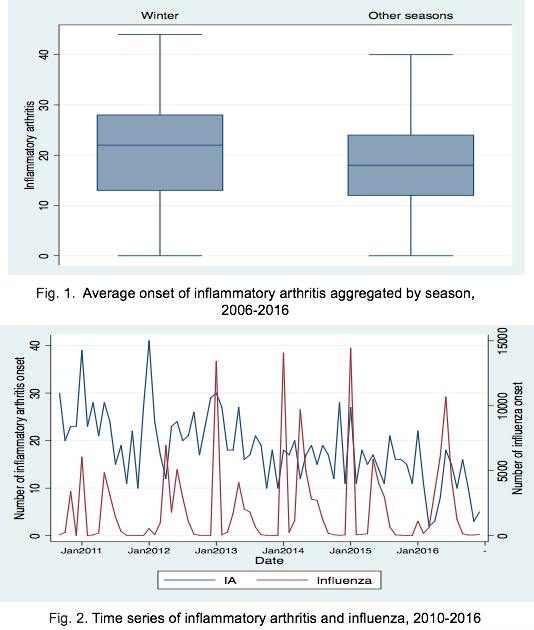Session Information
Session Type: ACR Poster Session A
Session Time: 9:00AM-11:00AM
Background/Purpose: Disease clustering suggests a possible environmental cause. Rheumatoid arthritis (RA) is an autoimmune disease that may be triggered by environmental factors such as viruses. Influenza is a common viral infection worldwide. There is a laboratory confirmation that similar inflammatory cytokines and cells are involved in the pathogenesis of influenza and RA. Also, in subjects without RA, the presence of antibodies to influenza in recently exposed to influenza individuals is associated with the presence of rheumatoid factor. We estimated the distribution of early incident inflammatory arthritis over time. We examined whether and to what extent seasonal variations in influenza may be associated with inflammatory arthritis first symptom onset.
Methods: Canadian Early Arthritis Cohort (CATCH) is a prospective observational cohort study of adults with early (≤ 12 months) incident inflammatory arthritis. We included patients enrolled from January 2007 till January 2017. We used patient-reported date of first symptom onset as a proxy measure of IA onset in our study, and estimated the seasonal distribution of inflammatory arthritis (IA) onset for 10 years of observations. Influenza time series was based on laboratory confirmed influenza A&B retrieved from the Canadian FluWatch surveillance program initiated in 2010. Bivariate analysis of influenza and IA was performed for 2010-2016 period using cross-correlations with different time lags, and time series Poisson regression with smoothing function to remove seasonality and long-term patterns in the exposure and outcome series. Both IA and influenza were recorded as monthly total frequencies.
Results: 2519 patients with IA were included, 88% had confirmed RA. More IA onsets occurred in January though the difference between months was not significant. There were significantly more IA onsets in winter compared to other seasons (Figure 1). Bivariate time series analysis of IA and influenza revealed similar high-level patterns in the onsets in January (Figure 2). We found that influenza weakly correlated with IA onset. We estimated that every influenza onset was associated with on average 0.0023 % increase in IA onset (p=0.04).
Conclusion: Patient-reported IA symptom onset occurs more frequently in winter, when the immune system is more susceptible to infections. Peak periods of influenza outbreaks in Canada over 6 years were very weakly associated with an increase in IA onset.
To cite this abstract in AMA style:
Kudaeva F, Speechley M, Klar N, Schieir O, Bartlett SJ, Bessette L, Boire G, Hazlewood G, Hitchon CA, Keystone EC, Tin D, Thorne C, Bykerk VP, Pope JE. Possible Association of Early Inflammatory Arthritis with Viral Outbreaks Such As Influenza: Time Series Analysis of the Canadian Early Inflammatory Arthritis Cohort [abstract]. Arthritis Rheumatol. 2018; 70 (suppl 9). https://acrabstracts.org/abstract/possible-association-of-early-inflammatory-arthritis-with-viral-outbreaks-such-as-influenza-time-series-analysis-of-the-canadian-early-inflammatory-arthritis-cohort/. Accessed .« Back to 2018 ACR/ARHP Annual Meeting
ACR Meeting Abstracts - https://acrabstracts.org/abstract/possible-association-of-early-inflammatory-arthritis-with-viral-outbreaks-such-as-influenza-time-series-analysis-of-the-canadian-early-inflammatory-arthritis-cohort/

